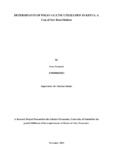| dc.description.abstract | Polio vaccination coverage is indicated as a perennial challenge which is persistently. Despite the fact that the current trend on global vaccination coverage increased whereby about 120 countries reached 90% polio coverage rates, under-vaccination remain to persist in many parts of Sub-Saharan Africa. Literature shows under-five children as faced and thus vulnerable of childhood diseases such as polio, measles and DPT amongst others. Based on this, the study pursued factors behind utilization of polio vaccine in Kenya among the newborn mothers. Kenya Demographic and Household survey (KDHS) of 2008 which contains factors associated with polio vaccine was used. The probit regression model has been employed in estimation. The dependent variable used was polio vaccine utilization while the independent variables used include: the age of the mother, marital status, maternal education, place of current residence, household head, employment, household size, female autonomy, wealth index and access to information. At 1%, 5% and 10% significance levels, the study findings revealed urban residence, primary education, being employed, wealth index and female autonomy as significant determinants of utilization of polio vaccine. Urban residence reduced polio vaccine utilization while being employed, primary education, female autonomy and wealth index positively and statistically increased utilization of polio vaccine among the new-born mothers. The study suggests development and implementation of policies targeting individuals in higher wealth cadres. As from the study, movement from lower wealth quintiles towards higher wealth quintiles is associated with increase in polio vaccination. Similarly, there is need to conduct workshops among the new-born mothers to inform them on their right and responsibility as parents to ensure the new-born is fully vaccinated against polio. This kind of awareness would lead to increase of female autonomy which in turn would lead to increase of utilization of polio vaccine | en_US |

